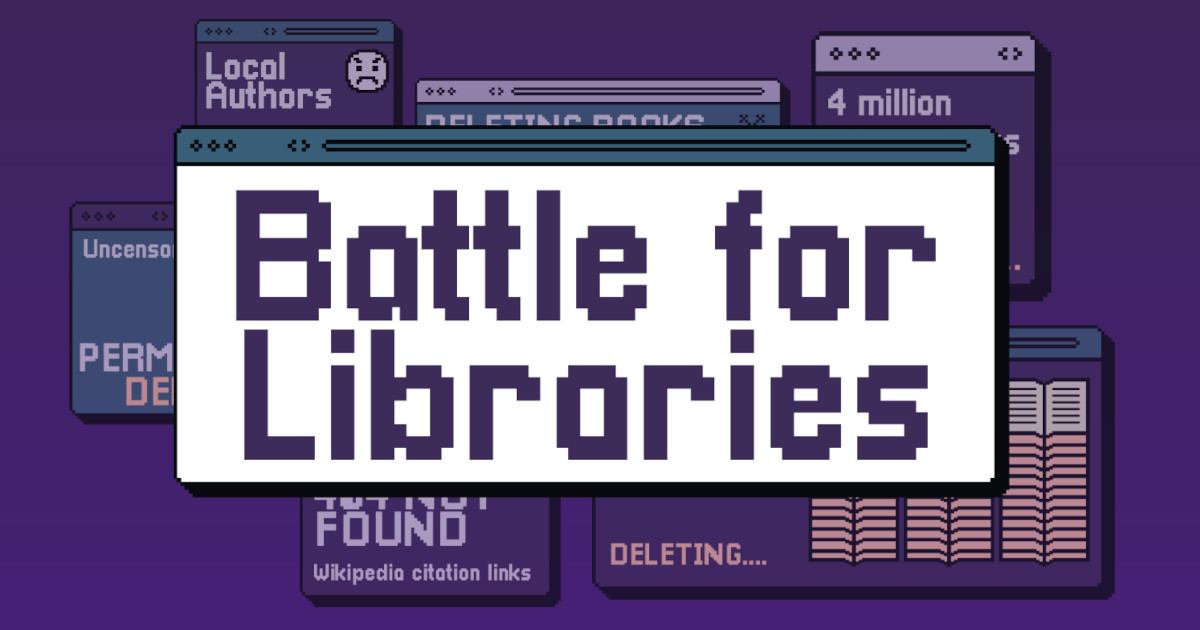It looks like the internet archive is needed assistance, I just heard about this today and figured lemmy could help spread this message around
Modern corporations are a damned plague. Most of these fuckers would destroy our whole cultural heritage in a heartbeat if it meant making a profit.
Yes, corporations exist to make profit, but come on, there are limits.
there are limits
I am glad you have a moral centre.
But that is the capitalist way. A Redditor once wrote: “*Corporations have no morals, no ethics, no code of conduct, no feelings, no empathy, and zero accountability. They have one goal and one goal only: to increase profits at all costs.”
Case in point: the climate crisis. Corporations are literally destroying their own home for a symbol of success that, like their products, is man-made: money. It is the ultimate pursuit of vanity.
Crazy, if you think about it for a moment.
Yeah. The monsters gnawing away at nature, public infrastructure, your friends? They are called corporations.
Btw, megacorps have multiple faces and are especially hungry.your friends?
I do not understand. Could you explain what you mean please?
The AI techbros wanna scare you with tales of AI becoming sentient and going rogue to destroy us all, when corporations, mindless machines made out of people to maximize profits at all cost, are already doing all that
i guess it doesnt matter to the execs, they will always have their little islands to live on while they destroy the rest of the world
Who’s gonna tell them that the small islands are the first thing to go in the climate crisis
Billionaires remember! Yacht first, island second.
True, but they’ll be the only ones able to afford to buy a boat. Lol.
And yet by law in some places (the US being one, I believe) they are treated as people, with certain rights.
Like people, but with a feduciary responsibility to gain wealth at every opportunity. Corporations are almost like vampires: they don’t need food or water, they don’t age, they have inhuman power, yet they wear the guise of people; they pass as human to make it easier to drain us of our blood, an endless thirst they feel compelled to heed.
Well said
Agreed, now what do we do about it?
I quit a very very well paid IT job in a very big corp because I did not want to participate to their anti-human, anti-planet shit…
What are you doing about it?
I decided not to pursue my interest in geology because I didn’t want to be stuck with the only employment options being oil companies.
It sucks that we need to give up so much even though they keep destroying and pillaging.
Respect! Hope you will find your way following your passion and working for the Good!
What am I doing about it? For the most part, nothing at the moment besides actively refusing to purchase from a small number of companies—Nestlé, Walmart, Amazon, etc—mostly out of principal as I’m not illusioned enough to think one person will make a difference in this sense). Primarily because at the moment I live in a dead-end job making barely enough money to buy food and trying to keep my car from disintegrating long enough for me to get to work and back.
Frankly, I’d love to do more, but there’s really not much I can do. Doesn’t mean I have to like it though. Just because you don’t have an alternative ready doesn’t mean you’re not allowed to dislike the current situation.
Thank you for your reply! You are doing what you can and that is important!
I appreciate you understanding. It really sucks our world has come to just having to deal with it most of the time.
I agree that that is the capitalist way, which is one of the reasons I hate capitalism. I’m no tankie, but I believe there are other ways, even ways that still use personal property as well as currency, beyond capitalism, which is just the use of personal property and currency to obtain more personal property and currency at all costs in an endless cycle.
Yes, corporations exist to make profit
Maybe now they do, but that itself is a cancerous perversion of their original purpose.
come and destroy the IPFS, then!
What is the IPFS?
The InterPlanetary File System (IPFS) is a protocol, hypermedia, and file sharing peer-to-peer network for storing and sharing data in a distributed file system. It allows users to host and receive content in a manner similar to BitTorrent.
That’s pretty cool. :)
a decentralized file hosting/sharing protocol that powers library genesis, for example
corporations attack anything that might challenge their ability to make a quick buck: everyone and everything else be damned. sadly the only way to overcome this kind of monster is a decentralized network of information hoarders. appealing lawsuits is just a bandaid.
the internet archive needs to reorganize. as long as it makes itself into a target as a centralized org, it will also get shot at by soulless corporate husks. im envisioning moving everything onto ipfs, that way anyone can help host as much or little as they like.
Ipfs into I2P would probably be ideal !
i2p integration would be awesome
They don’t need to do anything so drastic. They just need to stop doing things that blatantly provoke legal attacks like this. Their “Emergency Covid Library” was a foolish stunt that is endangering their primary objective of information preservation, they wouldn’t have been sued if they’d just kept on carrying on as they were before.
the corporations dont care. why should the archive be under the pressure of the soulless suits at all? any “stunts” are just excuses for doing what they will do anyway: pick on anyone who doesnt bow to their petty whims.
no, saying that this is the archive’s fault is so gross, and just says that you accept their bullying and blackmail as somehow moral
archive should decentralize, that’s the only real solution imo
Archive has been around for well over a decade with no issues outside of sporadic DMCA claims against user uploaded content. For many many years they have been left alone, despite hosting a shit ton of copyrighted material.
Occasional legal battles that they’ve handled with no problems with the help of the EFF. This is the first “existential threat” to them in quite a long time.
This is absolutely because they pulled the emergency library stunt, and they were loud as hell about it. They literally broke the law and shouted about it.
Libraries are allowed to scan/digitize books they own physically. They are only allowed to lend out as many as they physically own though. Archive knew this and allowed infinite “lend outs”. They even openly acknowledged that this was against the law in their announcement post when they did this.
I can absolutely say this is their own damn fault while disagreeing with the law they broke. There, I just did.
This is absolutely because they pulled the emergency library stunt, and they were loud as hell about it. They literally broke the law and shouted about it.
I think that you are right as to why the publishers picked them specifically to go after in the first place. I don’t think they should have done the “emergency library”.
That said, the publishers arguments show they have an anti-library agenda that goes beyond just the emergency library.
Libraries are allowed to scan/digitize books they own physically. They are only allowed to lend out as many as they physically own though. Archive knew this and allowed infinite “lend outs”. They even openly acknowledged that this was against the law in their announcement post when they did this.
The trouble is that the publishers are not just going after them for infinite lend-outs. The publishers are arguing that they shouldn’t be allowed to lend out any digital copies of a book they’ve scanned from a physical copy, even if they lock away the corresponding numbers of physical copies.
Worse, they got a court to agree with them on that, which is where the appeal comes in.
The publishers want it to be that physical copies can only be lent out as physical copies, and for digital copies the libraries have to purchase a subscription for a set number of library patrons and concurrent borrows, specifically for digital lending, and with a finite life. This is all about growing publisher revenue. The publishers are not stopping at saying the number of digital copies lent must be less than or equal to the number of physical copies, and are going after archive.org for their entire digital library programme.
this is a fair assessment.
regardless, if they want to do what they’re doing, they need to decentralize.
They need to decentralize because it was always only a matter of time before they pissed off the wrong capitalist sociopath or piss baby politician.
Yeah, as soon as I read about that I realized that they fucked up.
It was increadibly irresponsible by them at their current legal status.
They could just not poke the bear
they tied meat to themselves and ran at the bear screaming
Europe is voting this weekend. If you care about copyright reform, you should consider voting for the European Pirate Party. IA is probably in the wrong here, legally. But many would argue it’s morally right to have free access to information. Sure, shadow libraries are popping up everywhere and we have access to more information than ever before, but if we really want access for everyone, we need different copyright laws, and for that we need politicians.
Sadly in countries without a pirate party, like Denmark, you can’t (as far as I know) vote for the EP pirate party.
Does voting for a party like that even help anything? I’m asking because my voting experience is US, and everyone knows how many parties matter here. So I’m curious.
It does a bit, since every party will be represented in the European council based on the number of votes they have. It’s not an election where the winner takes all.
I think the pirates had one or two representatives in the council, which is enough to start debates and make proposals. They obviously can’t push anything through by themselves.
Nice. That sounds like more than we have available. Thank you
Yes. In most European countries even small parties can get seats. In my country there are 8 parties in parliament, for example, and 2 of them didn’t use to be there 2 election cycles ago (they were too small/new 8 years ago but eventually grew in popularity and got enough votes for representation).
Of course if they only have 1 or 2 members in parliament they typcily tend to form coalitions with other like-minded parties so they can get more voting power.
I wonder how many people that aren’t from the US running around telling people to vote third party their are, because of what you just described.
deleted by creator
Everyone that wants context should read this: https://lunduke.substack.com/p/the-internet-archives-last-ditch
Listen, I love the IA and everything they stand for, but they’re not winning this. They fucked up and gave away copyrighted content, for free, in unlimited amounts during covid. They then proceed to melt down in court because they know it’s impossible to win. Now they’re seeking empathy from everyone and not talking about why they got sued - which is giving away potentially millions of copies of other people’s work…
And everyone that wants unbiased context should read the wikipedia page:
https://en.wikipedia.org/wiki/Hachette_v._Internet_Archive
The judgment basically completely ignored IA’s arguments towards fair use. EFF filed an amicus brief that explains how baseless the judgment was. Assuming the entire US court system isn’t in the corporate pocket yet they will win this on appeal.
It’s ridiculous to assume that an organization whose main purpose is data archival would knowingly and blatantly ignore copyright law. IA didn’t ignore it, they did they homework and saw that their use qualified as fair use. Then they met a judge who doesn’t give a shit about that. Nobody can prepare for that in advance.
Assuming the entire US court system isn’t in the corporate pocket
I love your optimism
Their argument towards fair use wasn’t ignored. It was inapplicable.
It’s ridiculous to assume that an organization whose main purpose is data archival would knowingly and blatantly ignore copyright law
Except that’s exactly what they did. They knowingly and blatantly violated copyright law. They had a system in place to ensure fair use compliance. They intentionally disabled that system, in violation of fair use, to allow unlimited free downloads of the books they had archived.
IA’s entire argument was basically “but we’re a library” and totally missed the part where even public libraries need to comply with copyright law. Even with ebooks, they can’t simply distribute an unlimited number of copies; They have licensing agreements in place, for a specific number of specific ebooks to be checked out at any one time. And they have to use time-locked DRM to ensure compliance, by automatically revoking users’ reading ability when their check-out time is up. IA did precisely none of that.
Huh. TIL. I always wondered why libraries treat ebooks like physical books.
In this case, they absolutely did. They had a CDL in place specifically to comply with copyright law, and they willfully and intentionally disabled it.
The publishers also had arrangements with local libraries to expand their ebook selections. Most libraries have ebook and audiobook deals worked out with the publishers, and those were expanded during the lockdowns. Many of the partner libraries preferred those systems to the CDL because they served their citizens directly. A small town in Nebraska didn’t have to worry about having a wait list of 3000 people ahead of the local citizen whose taxes had actually bought the license the Internet Archive wanted to borrow.
The Internet Archive held a press conference right before the ruling comparing the National Emergency Library to winter-library lands, but that’s simply not accurate. The CDL they had in place before and after was inter-library loaning. The CDL was like setting up printing presses in the library and copying books for free and handing them out to anyone.
Under the existing CDL, they could have verified that partner libraries had stopped lending their phycical copies of the books and made more copies of the ebooks available for checkout instead of just making it unlimited and they’d have legally been fine, but they did not, and the publishers had every right to sue.
The publishes also waited until June to file suit: well-after most places had been re-opened for weeks.
IA does important work, but they absolutely broke the law here, and since they did it by intentionally removing the systems designed to ensure legitimate archival status and fair-use of copywritten works, they have pretty much zero defense. It wasn’t a mistake or an oversight. And after reopening they kept doing it for weeks until they were sued and were able to magically restore the legal system the same day the lawsuit was filed.
You’re using the publisher’s arguments in your comment. If anybody’s interested, here’s the IA’s counter-argument. It boils down to the fact publishers are challenging practices that used to be considered fair use… just because they can.
This decision has wide-reaching implications that will affect all libraries, not just the IA.
Ultimately we’ll just have to see what the appeal decision will be.
Their counter-argument isn’t a legal argument. They’re saying they did it because they think the publishers aren’t being fair.
And they’re talking mostly about format-conversion, which isn’t the problem here.
You can absolutely make format conversions to digital for archival purposes. What you cannot do is them make a bunch of copies and give them away for free simultaneous use. That is not fair use. That’s 100% piracy.
The CDL was built specifically to ensure that only one digital copy was on loan for each owned copy of the material because the IA absolutely knew that was the law.
In that counter argument they are essentially admitting that 99% of their content was distributed without the copyright holder’s consent.
In the CDL lawsuit, they have admitted that of the millions of books we have digitized, they themselves have only made about 33,000 available to libraries; only about 1% of what we have done, and only under restrictive and expensive license agreements. This is, they claim, the essence of their copyright rights: the ability to restrict access to information as they see fit, to further their theoretical economic interests, without regard to libraries traditional functions and the greater public good.
Was it fair use in the past to redistribute reprints/format-conversions of works without the copyright holders consent?
I agree that copyright law sucks… but that’s why it needs to change so it actually serves “the greater public good”. The judiciary system is not the right place to advocate for that (they don’t make the law, just interpret it), so I don’t really think there’s much hope in them winning this. Sadly.
Assuming they don’t win, is there any contingency in place to preserve all their data? I don’t know how exactly because I assume there’s an absolute fuckton of it, but it would be such a shame if all of that was lost forever.
I’d love to see it become like the Pirate Bay, where they squish one and ten more pop up to replace it, but I don’t know if that’s even possible.
That worked for pirate bay because they were storing a miniscule amount of actual data. Torrents are really small. The actual data is stored in the peer to peer network. The torrents are just tracking where in the p2p stuff is.
IA isn’t like that. They probably store exabytes of data.
@[email protected] Thoughts?
@Cracks_InTheWalls @CrabAndBroom I think there are tons and tons of yummy little square boxes that will take all of the letters you type into a keyboard and then put them somewhere for everybody to see.
Lol, fair. I’m still not well versed in inter-service ActivityPub stuff. I don’t know if you’ll see this or see any of the parent comments here on Lemmy.
Contingency plans if IA loses the appeal about the library stuff, or in general has something happen that puts IA’s collections at risk of being lost. Any thoughts on the matter? Also cool if it’s not something you want to talk about, I know you don’t speak for the whole org.
How do we archive the archive?
@Cracks_InTheWalls I’m quite aware of the thread you are connecting me to. My answer stays the same.
Ah, understood. Thanks!
Yeah, pretty much everyone who understands copyright agreed that this was the dumbest idea imaginable. But IA stupidly proceeded anyways, and now they’re finding out that the long studded dildo of justice rarely arrives lubed.
I love IA. I use it all the time. But this was just a blatantly stupid move. No amount of crying about it is going to change the fact that they seriously fucked up and angered the most well-established copyright holders in the world.
That’s not the full article, see https://lunduke.locals.com/post/5556650/the-internet-archives-last-ditch-effort-to-save-itself
I don’t know what happend the last few years with Lunduke, but it seems like he went down the conservative/conspiracy rabbit hole and now I don’t trust anything he writes anymore. Please see for yourself, this article is a good starting point: https://lunduke.substack.com/p/the-tech-industry-hates-you?utm_source=profile&utm_medium=reader2
I think this explains his stance a bit https://piped.kavin.rocks/watch?v=rRDEkMAcwrQ I agree with some bits (because code quality does matter more than being nice when it is your profession), disagree with some (because being a grumpy idiot will harm your ability to build on collaborative projects).
PS: but yea, then there is also the video about the tech industry where he cherrypicks outrage and contradicts himself and agrees that Linus is rude and divisive…which sort of discredits him, because he only seems to like angry but competent people when they agree with him.
deleted by creator
deleted by creator
Would you care the elaborate more?
The nonprofit Internet Archive is appealing a judgment that threatens the future of all libraries. Big publishers are suing to cut off libraries’ ownership and control of digital books, opening new paths for digital book bans and dangerous surveillance.
Join 28,000+ signers on the petition below to show your support for the Internet Archive, libraries’ digital rights, and an open internet with safe, uncensored access to knowledge.
Lol, a petition won’t stop this unless it’s a petition to bribe the judge. The US is owned by corporations.
Sure, but it is still better than doing nothing.
It feels better than doing nothing.
If you can convince yourself you’re not doing nothing.
I’ve never been that good a liar.Large petitions also serve as a way of getting the word out.
Yep. Petition gets large enough for media attention, word is spread, MAYBE people get active.
But Then police beat on them, Trump supporters defend the corporate interests of their supreme lord, it all goes down the shitter anyway.
So don’t ever get active or protest or do anything?
I don’t know.
I still think there’s at least some value, even if the only thing it accomplishes is getting people to talk about it. Many people have never even heard of The Internet Archive.
Either way, there isn’t really a reason not to.
Only things that are effective are better than doing nothing. Doing ineffective things only gives a false sense of accomplishment and thus reduces the incentive to try harder to be effective, which means they’re actually worse than doing nothing.
Online petitions, “free speech zones,” and other easily-ignorable things are like honeypots for activism, designed to neuter it.
Sure, but “effectiveness” is usually not a binary and is often difficult to measure. Small, but persistent changes should still add up. Eventually.
So long as people recognize that these things are in fact quite toothless, I’m not sure they are entirely detrimental. There’s no reason this couldn’t be used as a starting point for more effective action, now that signatories are in greater contact with the campaign.
It’s not even a question of being “owned by corporations”. Judges don’t care about petitions. They’re not politicians, their job is to adjudicate the law.
In theory. In the US, at least (I don’t know about other countries), some judge positions are voted in, In that sense, they most certainly are politicians.
On top of that, HAVE YOU SEEN OUR SUPREME COURT. THAT SHIT’S THE HALLMARK CHANNEL OF “OWNED BY OTHER ENTITIES”, be it actual politicians (Trump) or CEOs (also Trump), many of whom ARE both executives and politicans (again, not only Trump, but also a number of other reps & senators).
C’mon it’s at least worth a shot. To me at least.
With the current judges we could probably buy one fairly cheap. Crowd source lobbying I guess
Except it’s not a threat to the future of all libraries, it’s a threat to the future of “libraries” that decide to completely ignore copyright and give out an unlimited number of copies of ebooks. Basically turning themselves into book-focused piracy sites.
I’m incredibly frustrated with Internet Archive for bringing this on themselves. It is not their mandate to fight copyright, that’s something better left in the hands of activist organizations like the EFF. The Internet Archive’s mandate is to archive the Internet, to store and preserve knowledge. Distributing it is secondary to that goal. And picking unnecessary fights with big publishing houses like this is directly contrary to that goal, since now the Internet Archive is in danger.
It’s like they’re carrying around a precious baby and they decided it was a good idea to start whacking a bear with a stick. Now the bear is eating their leg and they’re screaming “oh my god help me, the bear is threatening this baby!” Well yeah, but you shouldn’t have brought a baby with you when you went on a bear-whacking expedition. You should have known exactly what that bear was going to do.
Exactly. I hate fucking everything about this. I love the internet archive and nearly all they do.
In principal I love their “covid-19 emergency library” or whatever they called it. In practice? They absolutely know better than to pull stunts and I’m terrified that this will spell the end for one of the greatest knowledge and media resources of the modern age. For shit that was effectively already available to the public through ebook piracy sites.
They already operated on shaky ground, hosting downloads for a metric ton of shit that is unquestionably still under copyright (despite their claims to only be archival of things that are not), skating by on technicalities and by not drawing too much attention to themselves.
Plus, there were so fucking many better ways to do the “free digital library” thing without jeapordizing themselves.
- Have some volunteers “misuse resources”: load an SSD up with the book files, “borrow” some compute power to decrypt/remove drm, pass batches off to existing ebook “dumping” groups to stagger releases and obsfucate the true source. This would ensure that any material they had which was not already available on the high seas would get there.
- Make a big red banner on the site to a blog post with the generic “While we would never condone piracy or copyright infringement, we understand that times are extremely hard right now [blah blah] here are some links to community guides on how to access learning literature (pirate ebooks) during these trying times [blah blah] Please abide by your local laws.”
You summed it up exactly. As one politician put it, the Internet Archive does not decide copyright. They have became to big for there own shoes.
The thing that drives me nuts is that I really do value that baby they’re carrying around. It is precious. But I don’t want to give the Internet Archive money just to funnel into the pockets of their lawyers and settlement payments to big publishers due to these unrelated quixotic battles.
I was hoping that the IA would have learned a lesson from losing this court case, they should have settled as soon as they could. I’m sure the publishers don’t want the bad publicity of “destroying” the Internet Archive, they just want them to stop blatantly violating their copyrights. But this appeal suggests that they haven’t learned that lesson yet.
In an ideal world there’d either be some kind of leadership shakeup at the IA to get rid of whoever was behind this stunt, or some kind of alternative IA-like organization appears to pick up the archive before the IA goes broke and its collection ends up being sold off to the highest bidder. Or simply destroyed.
I’m sure the publishers don’t want the bad publicity of “destroying” the Internet Archive
LOL. LMAO, even.
I have little doubt that publishers detest the Internet Archive and the deepest desire of their shriveled, blackened heart is to (figuratively) mount its stuffed corpse as a trophy over their fireplace mantel.
Cynicism like this is completely unfalsifiable not to mention unproductive.
True, but that doesn’t make him wrong. While generalizing is inherently wrong, the chances of ANY corporation giving a fuck about their image for destroying something that could spell them not earning a couple of bucks is low to null.
Look around. The amount of complains about privacy breaches from all the tech giants, and some midgets, is at its highest ever, and do you see any of them pedaling back?
I am part of an executive suite myself, and while I’m trying to make a difference, you should see the ridiculous amount of pushback I get on ANYTHING that could spell improving user and staff experience, sometimes even when it has absolutely no negative financial impact. It’s like they’re programmed to destroy.
You will find a few good men and women in the Corp world, but this few can’t do much against the majority, which happens to be full of bloodsucking pricks.
It is not a great situation. I wish they would break into smaller organizations
I love the internet archive but yeah, there was just no way this wasn’t going to backfire. And by handling things the way they did they damaged the reasonable defense of archivist (not only for themselves) because publishers and others often cite that archival and backups are just
“pseudonyms”“synonymous” for piracy.They aren’t but the way this was handled made it impossible for them to argue otherwise and it also creates a legal precedent for lawsuits and judgments by publishers against others who are doing such work.
They did not ignore copyright. The judge brazenly and incorrectly dismissed all their arguments for fair use. They had no way to foresee they would meet a judge that would go that far.
it’s a threat to the future of “libraries” that decide to completely ignore copyright and give out an unlimited number of copies of ebooks
So do I, so this is very bad.
deleted by creator
Another excerpt under why from the FAQ section
**The Internet Archive has been scanning millions of print books that they own, and loaning them out to anyone around the world, for free. Other libraries like the Boston Public Library are using the same process to make digital books too.
This is happening because major publishers offer no option for libraries to permanently purchase digital books and carry out their traditional role of preservation.
Instead, libraries are forced to pay high licensing fees to “rent” books from big tech vendors that regard patron privacy as a premium feature and are vulnerable to censorship from book banners. Under this regime, publishers act as malicious gatekeepers, preventing the free flow of information and undermining libraries’ ability to serve their patrons.
But it looks bad if publishers sue the Boston Public Library. So instead, they’ve launched an attack on a groundbreaking nonprofit, including a lawsuit with clear repercussions for every library in the US. On March 24, 2023, a lower court judge issued a ruling that stated the profits of big media companies are more important than the right of libraries to preserve our history and ensure it’s available to the world. Then, in a copyright troll move for the ages, the same attorney representing Big Publishing filed a second absurd lawsuit against the Internet Archive for it’s research library of old music recordings.
Nevertheless, the Internet Archive are appealing to a higher court and will keep fighting for the digital rights of libraries.**
This buries the lede so deep it’s popping out the other side of the globe.
The entire core of this case is that (in abscence of more lenient agreements with publishers) traditional libraries are allowed to digitize physical books in their posession, as long as they do not lend out more copies than they physically own. The Internet Archive decided that they would lend out infinite copies, because “covid lol”.
Boston Public Library isn’t being sued because they don’t lend out more than they own! It has precisely zero to do with fucking optics.
Edit: Don’t get me wrong, I hope they win this case, but them continuing to play stupid helps nobody. Unfortunately, as discussed thoroughly online when they opened the covid19 emergency digital library, they fucked around. Now it seems they may have to find out.
Fuck.
I really hope someone gets hold of the data and shares it on p2p or otherwise. If all this data is deleted it would be equivalent to nuking pyramids or burning Picasso paintings.
Honestly, I’d say it would be much much worse than your examples. It would be erasing parts of history itself.
Fuck yes, we need to get our hands on this stuff for fucks sake. I have shit there I don’t even know I need yet
Can someone fucking near get their ass there and do a legendary copy paste operation on a massive scale
Exactly. Losing Internet and digital history would create another dark ages for future historians. Everything we’ve done would just be gone.
If I had more money than humanly usable I would create a project that transcribes wikipedia or whatever onto stone/metal plates so it’s not forgotten.
…library… Alexandria…
Good luck, every day more than 1PB is uploaded to IA.
That’s one of the reasons why uploads to the Archive have torrents.
Now if they’d just fix the damn tracker…
The DDOS attack or the lawsuits?
This one pertains to the lawsuits.
deleted by creator
Didn’t know about this, but sounds like a good cause.
Is there any legal risk involved with this? Is it recommended to run behind a VPN?
No, VPNs are not allowed. See here for more info.
Made me look for internet archive merch and found they actually do have a store for it
They made a really dumb move and now have to pay for it. I understand their importance but it doesn’t seem like they do - or they are naive enough to believe corpos have good will.
They broke law in such a dumb way, and it’s a pity they put their entire project in jeopardy. My only thought while deciding to donate is “what will prevent them from doing something this dumb again?”
There’s no link. Down voted.
Update: OP updated the post to include a link. Up voted.
Seriously no one cares if you downvote or upvote stuff. Get lost with your inept attempt at manipulation
Yeah and I was supposed to stay calm and cute this whole week see what you have done with your shitty comment?
I was asking others to downvote low effort content to improve the quality of the content on the platform for others.
Yeah where? You just said down voted like your personal opinion on the post mattered. Then edited to say upvoted like anyone cared or you were deluded into thinking it was thanks to your little tiny point down
Maybe I am angry but the frikin internet archive is going down, I hate this shit
Can they sink the IA name and just set up as another entity? I mean, declare bankruptcy etc. What happens to the archived data in this scenario? I am not a lawyer so I have no idea
Edit perhaps they can setup up an entity, sell the data to it, and bankrupt IA?
Surely not or else companies would be doing this every day to avoid litigation.
The mercenary company Blackgate(?) has done it a dozen times.
Again, I have no idea what I am talking about but you can have provisions to protect assets in bankruptcy. But besides that, I am not sure if distributing the assets to another nonprofit entity prior would help save the archived data
I mean, companies with a lot of employees, sure. But companies that are mostly just data, like movie watching sites, do it all the time
Is this suppost to be a link
I was trying to link to Battleforlibraries but I failed, it’s my first lemmy post
Please update the post to include the link. Use the edit button.
Okay I edited the post and changed the link, tell me If I was successful!
It was successful. Thank you.
Just sent them a couple of bucks. Wish I could give more but the conversion rate on my currency is atrocious lol 🫠
deleted by creator
This is the worst kind of misrepresentation of tech. Nothing you said is explicitly false, it sounds true in passing, but it sure is effectively false.
The amount of data you can actually store in any single node/transaction on a given blockchain is traditionally very small. Even most NFTs are not truly “on the chain” as in the image data fully stored in a node/element, it’s instead a “smart contract” which just says X identity owns Y (with Y itself being stored elsewhere). There have been many many attempts at actually storing data on various chains and there hasn’t been any successes significant enough to come even close to being able to store the classic 90’s Space Jam website, let alone the fucking Internet Archive.
Beyond that, you absolutely can take down nodes in a chain, so to speak. Numerous major “heists” have been “rolled back” or had their nodes/transactions flagged to be ignored by marketplace admins.
You’re right about NFTs. There’s no reason to store the data on chain. Chain stores the metadata and pointers to the files (IPFS, torrent/magnet link whatever). Chain administers how many copies etc should exist and enforces those rules. Filecoin etc have already successfully done this.
deleted by creator
Downvote this guy all you want, but this is an incredibly true point. For 15 years, Bitcoin has maintained a distributed, uncensorable ledger, the question is, can we use similar ledger tech to store archive.org? Wikipedia is a single point of failure, so is Archive.org. So is the library of congress. We could easily store all the text content of wikipedia on chain that’s under 100GB, along with IPFS pointers to media content. Long-term, humanity needs a resilient censorship-resistant system to store our collective knowledge and history. These systems, when sufficiently large, are uncensorable and incredibly difficult to exercise undue influence against or shut down. Ask anybody whose tried to get a judge to enforce a judgement against the bitcoin blockchain lol. And they can survive quite well major disruptive events like wars, natural disasters, and even widespread network disruptions. Blockchain can also solve the spam problem that plagued early P2P systems like Gnutella/Ed2k/etc. Everybody moved to BitTorrent because we could trust custodians (trackers and indexers) to curate lists of valid torrents. But that can be decentralized now.
There’s over a dozen different blockchain projects working on the “file storage problem”, some of them have very interesting proposals, at least one of those is going to emerge from the smoke with something that will replicate archive.org’s current role, but it might be a few years before that happens. Already, we have blockchains which offer “decentralized file storage marketplace” that competes pretty well with current file storage providers (AWS etc), and some of them have been running for years.
And guess what? You don’t need blockchain for that.
Torrents exists, IPFS dropped dependency on block chain. What blockchain do is that if your literal neighbor has the file you want, you must first connect to the global super inefficient network to sync your chain. And if you have censored Internet? Well…
Layer torrent on top of Yggdrasil on top of I2P and you’ll get faster, more decentralized and more resilient network than any blockchain ever done. Such network would continue to work from friend to friend even if your whole town get cut from global net.
deleted by creator
You don’t need blockchain to accomplish what the internet archive is, just a network of computers that share a part of their disk space to the other computers. This is just a torrent network at the end of the day
deleted by creator
Blockchain is great for when you need global consensus on the ordering of events (e.g. Alice gave all her 5 ETH to Bob first, so a later transaction to give 5 ETH to Charlie is invalid). It is an unnecessarily expensive solution just for archival, since it necessitates storing the data on every node forever.
Ethereum charges ‘gas’ fees per transaction which helps ensure it doesn’t collapse under the weight of excess usage. Blocks have transaction limits, and transactions have size limits. It is currently working out at about US$7,500 per MB of block data (which is stored forever, and replicated to every node in the network). The Internet Archive have apparently ~50 PB of data, which would cost US$371 trillion to put onto Ethereum (in practice, attempting this would push up the price of ETH further, and if they succeeded, most nodes would not be able to keep up with the network). Really, this is just telling us that blockchain is not appropriate for that use case, and the designers of real world blockchains have created mechanisms to make it financially unviable to attempt at that scale, because it would effectively destroy the ability to operate nodes.
The only real reason to use an existing blockchain anyway would be on the theory that you could argue it is too big to fail due to legitimate business use cases, and too hard to remove censorship resistant data. However, if it became used in the majority for censorship resistant data sharing, and transactions were the minority, I doubt that this would stop authorities going after node operators and so on.
The real problems that an archival project faces are:
- The cost of storing and retrieving large amounts of data. That could be decentralised using a solution where not all data is stored on a chain - for example, IPFS.
- The problem of curating data and deciding what is worth archiving, and what is a true-to-source archive vs fake copy. This probably requires either a centralised trusted party, or maybe a voting system.
- The problem of censorship. Anonymity and opaqueness about what is on a particular node can help - but they might in some cases undermine the other goals of archival.
deleted by creator
???
Taking down PirateBay didn’t kill the torrents it hosteddeleted by creator
deleted by creator
Well then, just use an anonymus service to distribute magnet links (i2p, tor, blockchain)
deleted by creator
I agree but I find blockchain technology too costly hardwarewise, a simple anonimizing network may be enough



































